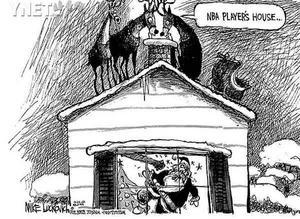| 圣诞老人惹谁了(图) |
| http://www.sina.com.cn 2004/12/07 12:31 北京青年报 |
 圣诞老人惹谁了 On November 22 three members of the Indiana Pacers basketball team charged into the spectator area at an athletic facility in suburban Detroit and attacked several Detroit Piston fans. Leading the charge was Ron Artest, apparently incensed because a Piston fan had thrown a drink at him. When nearby Piston fans joined in and those farther off lobbed food and even a chair, a full-scale brawl erupted of the kind that one used to see in Hollywood westerns. American commentators are aghast, and have been talking and writing about the meaning of the incident ever since. Although both fans and players of American ice hockey in particular tend to have short tempers, fistfights, brawls and riots are definitely not expected in US stadiums. The rowdy conduct of European, especially English, football fans is generally viewed with scorn by Americans, not a few of whom take a certain quiet pride in the contrast between American self-restraint and boozy European brutishness. But standards are falling in the US and incidents of sports-related violence multiplying. Some commentators say the American emphasis on winning at all costs is undermining sportsmanship and good manners. Others point to the recent emphasis in US schools on cultivating student self-esteem -- at the expense of self-restraint. Both factors may be at work. It is no accident that American teenagers picked up the slang term "dis" from black hiphop lyrics in the 1980s. To dis someone means to show him disrespect (the first syllable of the word "disrespect" has been split off and turned into a verb). Dissing a drug-addled gang member in a rough urban neighborhood is, needless to say, likely to get the disser slugged, stabbed or shot. Middle-class assertiveness training①will not produce reactions of that sort to incidents of perceived disrespect, but the frank display of anger (done inyourface, i.e. openly and inviting retaliation, as current American lingo has it) has definitely become more accepted in recent years. Instead of arguing in a polite but firm manner with, say, airport ticketing agents, frustrated Americans increasingly raise their voices and make demands. Many Americans, not least those commuting on crowded highways (where roadrage is common), seem to be on a shorter emotional tether than in the past. Cartoonist Mike Luckovich offers no insights into the causes of the violence, but he forecasts hard times ahead for the innocent. Here Santa has parked his sled and reindeer on the roof of the house of an NBA player. When he goes down the chimney to deliver Christmas gifts, he finds himself being assaulted by the very tall householder!(听英文53597,文章注释535971) www.ucomics.com |
| 双语漫画:圣诞老人到底惹谁了(图) |
11月22日,在美国底特律市郊区的一个体育馆,印第安娜步行者队的三名队员冲进观众席打了底特律活塞队的几个球迷。罗恩·阿泰斯特领头干了这事,似乎是因为活塞队的一个球迷向他扔饮料瓶而激怒了他。当附近的活塞队球迷加入了争斗,远处的也把食品砸了过来———甚至还扔来一把椅子,一场全面的争斗爆发了,那是在好莱坞西部片中常常看到的场面。 美国的新闻评论人士对此感到非常震惊,此事意味着什么,他们一直在谈论,一直在写文章。尽管美国冰球的球迷和球员特别容易激动,但人们认为殴打、争斗和骚乱绝对不应在美国的体育场内发生。美国人通常瞧不起欧洲(尤其是英国)足球迷的粗暴行为;与欧洲人喝醉般的粗野行为相比,美国人的自我克制让很多美国人心中颇感自豪。 但是,美国人的行为标准正在降低,与体育赛事相关的暴力事件越来越多。有些评论家认为,美国人强调要不惜一切代价赢得比赛,因而损害了运动员的道德和良好举止;还有评论家将矛头指向近来美国学校的教育,认为学校过分强调培养学生的自尊———而这是以牺牲自我约束力为代价的。 也许这两个因素都在起作用。八十年代,美国青少年从黑人嘻哈乐歌词的俚语中学来了“dis”一词———这一现象并非偶然。“dis”谁就是对谁表示不敬[“dis”取自disrespect(不敬)一词的第一个音节,将其作为动词使用]。如果在粗陋的城市贫民区对一个吸毒成瘾的帮派分子表示不敬,不用说,不敬者很可能会遭暴打、被捅了刀子或被枪杀。但对于所觉察到的不敬,中产阶级所受的果敢教育并不会让人做出上述那些举动,但不加掩饰地表达愤怒(正如当今美国语言中的“怒在你的脸上”一词,即公开地不顾对方可能报复地表达愤怒)近几年来肯定是更被人认可了。比如说,当机场售票人员表现出不敬时,受挫的美国人越来越多地是提高嗓门,提出要求,而不是用礼貌而坚决的语气争辩。许多美国人,主要是那些每天来往于拥挤的公路上(那里“道路争吵”很常见)上下班的人们,似乎比过去更容易急躁了。 漫画家麦克·鲁克维奇并没有为我们解析此类暴力行为的深层原因,但他预见无辜的人们要倒霉。漫画中,圣诞老人将雪橇和驯鹿停在一位NBA球员的屋顶上,当他从烟囱滑下去送圣诞礼物时,竟受到身材高大的房主的一顿拳脚! |
|
|
|
|
|
| Annotation |
| 新闻查询帮助 | |
| 热 点 专 题 | ||||
| ||||
|
|
教育频道意见反馈留言板 电话:010-62630930-5178 欢迎批评指正
新浪简介 | About Sina | 广告服务 | 联系我们 | 招聘信息 | 网站律师 | SINA English | 会员注册 | 产品答疑
Copyright © 1996 - 2004 SINA Inc. All Rights Reserved
版权所有 新浪网![]() 北京市通信公司提供网络带宽
北京市通信公司提供网络带宽